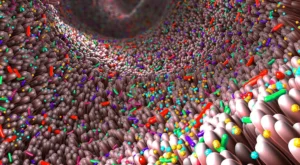It’s human to ignore a vital body part as long as it’s working as it should. The liver smoothly takes care of over 500 critical daily functions 24/7, keeping you healthy. It also creates various products our bodies require for optimal health.
Our society produces pollution, refined foods and oils, medications, and much more, and the liver must filter out the toxins these exposures leave behind. Sometimes, it needs support, and scientists are increasingly looking to probiotics to improve liver health. Below, we explore the use of probiotics for liver health and support.
What Is the Liver, Where Is it, and What Does it Do?
The liver is on the right side of the body, just above the stomach and pancreas. It is the largest organ in the body, dark red, weighs about three pounds, and is about the size of a football. It is such a critical organ that we cannot live without it.
The liver is essential for digestion. Here are a few of the most important ways it participates in digestion:
· Converts extra glucose into glycogen and stores it as energy for later use
· Processes and stores hemoglobin for iron
· Carries fats through the body, producing cholesterol and proteins
· Creates proteins for blood plasma
· Produces bile to remove waste and metabolize fats in the small intestine
· Generates immune factors that resist infection and remove bacteria from the bloodstream
· Clears the body of drugs and poisons through urine and feces
Gut Health and Liver Function
Researchers are investigating probiotics’ role in many different body systems, including the liver. In their studies, they have identified what they’re calling the gut-liver axis, which determines the connection between the two organs.
The system the body uses to create this bond is called enterohepatic circulation. The liver circulates biliary acids, bilirubin, drugs, and other substances, starting in the liver, moving to the bile, and entering the small intestine. After the cycle, these substances are reabsorbed and moved back to the liver to be reused about 20 times, often multiple times, during a digestive phase.
When intestinal flora is disrupted, the gut’s microbiome can damage the liver through the gut-liver axis. Conversely, studies have found that probiotics can improve liver health by restoring the intestinal microbiome to balance.
What are Probiotics?
The latest scientific definition of a probiotic is “Live organisms, which, when consumed in adequate amounts, confer a health effect on the host.” Probiotics are the helpful bacteria, viruses, and yeasts that colonize our intestines, skin, and urogenital systems.
Scientists are highly interested in probiotics today. They have performed multiple studies to determine how various strains of probiotics impact different body systems, including the liver, and how these minuscule organisms can positively impact health.
Best Probiotic Strains for Liver Health
Researchers have studied many strains of bacteria and found promising results with Lactobacillus, Bifidobacteria, Escherichia coli, Saccharomyces, and Lactococcus; Lactobacillus is the most frequently studied. Isolating the strain sounds simple, but there’s more to it.
The Lactobacillus genus contains about 300 different species of bacteria. Scientists have observed positive results from different strains for particular body systems but, to date, cannot pinpoint a single strain that can improve a specific organ or condition. Due to the promising results, researchers recommend further study.
Liver Detox Probiotics
Living in your body and dealing with multiple toxins exposes the liver to free radicals, bacterial endotoxins, lipopolysaccharides, inflammatory markers, and other harmful substances.
Liver and gut processes are indelibly linked. Probiotics improve liver function by balancing the gut microbiome, intestinal barrier function, immune response, and reducing endotoxins.
H2: How to Choose the Right Probiotic Supplements for Liver Health
When looking for the best probiotic supplements for liver health, there is more to consider than the strain. There are dozens of probiotic supplements on the market, and the quality you choose can make as much difference as the strain.
Dr. Ohhira’s probiotic supplements for liver health and detox rely on ancient Japanese wisdom and current scientific information. Consider Reg’Activ Detox & Liver Health. Along with Lactobacillus fermentum ME-3, which increases glutathione levels in the body, this effective supplement contains other traditional natural supplements: milk thistle, N-Acetyl-cysteine, L-Methionine, and L-selenomethionine. These additional elements further promote glutathione production in the body, which is vital to healthy liver function, and support super-antioxidant enzymes in the liver.
Criteria for Selecting High-Quality Probiotics
A low-quality probiotic may not give you the results you’re looking for. When choosing a probiotic to support your liver health, here are several things to consider.
- Is it hypoallergenic? If the probiotic contains other ingredients like gluten or dairy products, you may experience unintentional effects.
- Is it free of artificial additives? Check the label. Probiotic supplements may contain chemicals, preservatives, colorants, artificial flavors, and chemical fertilizers.
- Does it contain only natural ingredients? Check for ingredients that are natural, wild-harvested, and seasonal.
- Does it offer multiple probiotic strains? Many studies have used numerous probiotic strains because research has shown that the balanced microflora of many strains is the most conducive to health. Focusing on a single strain can potentially unbalance your microbiome.
- Has it been fermented for an extended time? Dr. Ohhira’s makes probiotics from all-natural ingredients fermented for three years, which enables the strains to learn how to work together, giving them the best chance of colonizing your intestines after ingestion.
- Does it contain prebiotics, probiotics, and post-biotics? These three elements work together to support probiotic effectiveness.
Incorporating Probiotics into Your Routine
You can get probiotics from certain foods or supplements. Here are a few tips on how to add probiotics to your life.
Choose Foods that Are Naturally Fermented
Manufactured foods have replaced traditionally fermented foods of the same name. Read labels and purchase foods that show that they are naturally fermented and contain live microorganisms.
Eat to Promote Probiotics
Probiotics feed on prebiotics. Adding these foods to your diet helps your natural flora and any probiotics you consume work better: Leeks, onions, garlic, asparagus, green bananas, oats, apples, cocoa, soybeans, and jicama are a few.
Avoid Foods that Interfere with Gut Health
Certain foods may interfere with your gut biome. Animal protein, especially if treated with antibiotics, deli meats, sweet desserts, fried foods, artificial sweeteners, packaged snacks, and sugary refined cereal products.
Using a Probiotic Supplement
When you eat foods that contain probiotics, you have no control over the potency or strains you are ingesting and whether they are still alive when you purchase the product. A probiotic supplement contains specific probiotic strains, so you know what you are ingesting and the potential benefits. Use the criteria above to select a high-quality probiotic and follow label instructions on how to take it.
FAQs about Probiotics for Liver Health
How do probiotics benefit liver health?
The liver and the gut are linked, exchanging various substances during digestion. When the gut has a healthy balance of beneficial microorganisms, these benefit the liver. When the gut is out of balance, it can negatively influence liver health.
What are the best probiotic strains for liver function?
Researchers have seen the most favorable results with Lactobacillus, Bifidobacteria, certain strains of Escherichia coli, Saccharomyces, and Lactococcus.
How should I take probiotics for optimal liver health?
You can add probiotic foods to your diet. If you also choose to use a probiotic supplement, follow the manufacturer’s instructions.
Are there any side effects of using probiotics for liver support?
Probiotics are generally considered safe, but they are living organisms and may temporarily cause bloating, gas, or constipation. If symptoms persist, see your doctor.
If you have a compromised immune system, a recent hospital stay, or a serious disease, Talk to a health professional before taking a probiotic.
A Few Final Thoughts
Dr. Ohhira creates the highest quality probiotic supplements for overall and liver health. We invite you to try our product. If you have any questions, contact us. We will be happy to talk with you.






